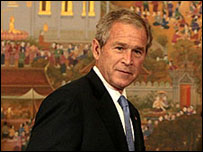 |
|
EAST
TURKISTAN INFORMATION CENTER |
|
Freedom, Independence and Democracy for East Turkistan !
|
|
INDEX: |
|
EAST TURKISTAN HISTORY |
 |
WUNN NEWSLETTER |
 |
ARCHIVES & PICTURES |
 |
HUMAN RIGHTS |
 |
WEATHER |
 |
UIGHUR MUSIC |
 |
UIGHUR ORGANIZATION |
 |
ETIC REPORT 97 - 98 - 99 |
 |
ETIC REPORT |
 |
DAILY WORLD NEWS |
 |
NATIONAL CONGRESS |
 |
REAL MEDIA FILES |
 |
CONTACT US |
 |
GUESTBOOK |
 |
|
|
|
|
| |
|
|
Uighur Press on Eastern Turkestan |
|
|
BBC Thursday, 7 August 2008 12:31 UK |
|
Bush chides Beijing over rights
 George Bush urges China to improve its
human rights records George Bush urges China to improve its
human rights records
US President George W Bush has expressed "deep
concerns" over China's human rights record in a
speech on the eve of the Beijing Olympics.
"The US believes the people of China deserve the
fundamental liberty that is the natural right of all
human beings," he said in the Thai capital, Bangkok.
He praised China's economy but said only respect for
human rights would let it realise its full
potential.
But China rejected the US president's comments.
"The Chinese government puts people first, and is
dedicated to maintaining and promoting its citizens'
basic rights and freedom," Foreign Ministry
spokesman Qin Gang said.
"We firmly oppose any words or acts that interfere
in other countries' internal affairs, using human
rights and religion and other issues."
'Firm opposition'
Mr Bush has been criticised by some campaigners for
going to the Games.
He flew to Beijing following the speech in Bangkok,
a stop on his final trip to Asia before he leaves
office in January.
The wide-ranging address, which included criticism
of the regime in Burma, was more nuanced than Mr
Bush's past speeches on China, the BBC's Jonathan
Head reports from Bangkok.
It is unlikely to cause much offence in China, our
correspondent says, and many people will see it more
as a valedictory speech for Mr Bush's record in Asia
rather than an outline of future US policy.
Mr Bush said he was optimistic about China's future
and said change in China would arrive "on its own
terms". Young people who grow up with the freedom to
trade goods will ultimately demand the freedom to
trade ideas...
But his criticisms of China's human rights record
were clear.
"America stands in firm opposition to China's
detention of political dissidents, human rights
advocates and religious activists," he said.
When it was controversially awarded the games in
2001 by the International Olympic Committee, Beijing
promised to make improvements in human rights, media
freedoms and the provision of health and education
But his criticisms of China's human rights
record were clear.
"America stands in firm opposition to China's
detention of political dissidents, human rights
advocates and religious activists," he said.
When it was controversially awarded the games in
2001 by the International Olympic Committee,
Beijing promised to make improvements in human
rights, media freedoms and the provision of health
and education.
But campaigners, such as Amnesty International,
say Chinese activists have been jailed, people
made homeless, journalists detained and websites
blocked, while there has been increased use of
labour camps and prison beatings.
In March, China suppressed violent anti-government
protests in Tibet. Beijing said rioters killed at
least 19 people, but Tibetan exiles said security
forces killed dozens of protesters in the worst
unrest in Tibet for 20 years.
The Dalai Lama, Tibet's exiled Buddhist leader,
rejected Beijing's claims he was behind the riots
and said he expressed good wishes for the success
of Games.
On Thursday, at least 1,500 Buddhists were holding
a protest in the Nepalese capital Kathmandu
against what they called China's violation of
religious freedom in Tibet. Correspondents say
there have been scuffles with police.
In Beijing, police dragged away three US
Christians who tried to demonstrate on Tiananmen
Square in support of religious freedom.
Four pro-Tibet activists from Britain and the US
were arrested and held briefly in the city on
Wednesday after a protest close to the Olympic
stadium.
Burma refugees
In his address, Mr Bush said the US recognised
that the growth sparked by China's free market
reforms was "good for the Chinese people" and the
country's' purchasing power was "good for the
world".
On foreign policy, he commended China's "critical
leadership role" in the negotiations to end North
Korea's nuclear weapons programme, and the "constructive
relationship" between Beijing and Washington over
Taiwan.
He also called for an end to what he described as
tyranny in Thailand's neighbour, Burma.
Friday's Olympic opening ceremony coincides with
the 20th anniversary of a democracy uprising in
Burma, which was crushed by the military.
First lady Laura Bush flew to the Thai-Burmese
border to spend the day at the Mae La refugee camp
where about 35,000 refugees live, having fled
their homes.
|
|



 George Bush urges China to improve its
human rights records
George Bush urges China to improve its
human rights records